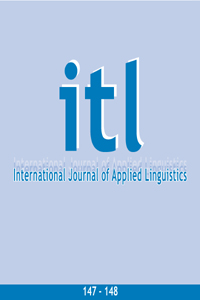 previous article in this issue previous article in this issue | next article in this issue  |

|
Document Details : Title: Working Memory and Writing in Bilingual Students Author(s): ADAMS, Anne-Marie , GUILLOT, Kim Journal: ITL - International Journal of Applied Linguistics Volume: 156 Date: 2008 Pages: 13-28 DOI: 10.2143/ITL.156.0.2034417 Abstract : The vocabulary, spelling and writing skills of French/English bilingual students aged between 12 and 15 years were assessed, along with their verbal working memory (VWM), visuo-spatial working memory (VSWM) and phonological short-term memory (PSTM) skills. The extent to which individual differences in writing performance reflected variations in working memory skills which were specific to the memory domain and the language of testing was assessed. All three components of working memory were significantly associated across languages confirming their independence in this bilingual sample. Significant associations were also identified between vocabulary knowledge and VWM in both languages. For text composition in English, significant associations were identified between spelling and PSTM assessed in English, with medium sized, but non-significant, correlations identified with vocabulary knowledge and VWM. For text composition in French, although the associations with spelling, PSTM and VWM were of a moderate effect size, none of these associations reached significance. Comparisons across languages revealed that although writing in English was not significantly associated with either French vocabulary or spelling, writing in French was associated with both these subcomponent skills assessed in English. Visuo-spatial working memory bore little association with either spelling or writing skills either within or across languages. Broadly speaking therefore the data were consistent with an interpretation of the relationship between working memory and writing that reflects a domain-specific view of the capacity limitations in working memory which constrain writing performance, rather than limitations imposed by a domain-general attentional construct. However, it was proposed that these verbal processing effects are not language-specific. |
